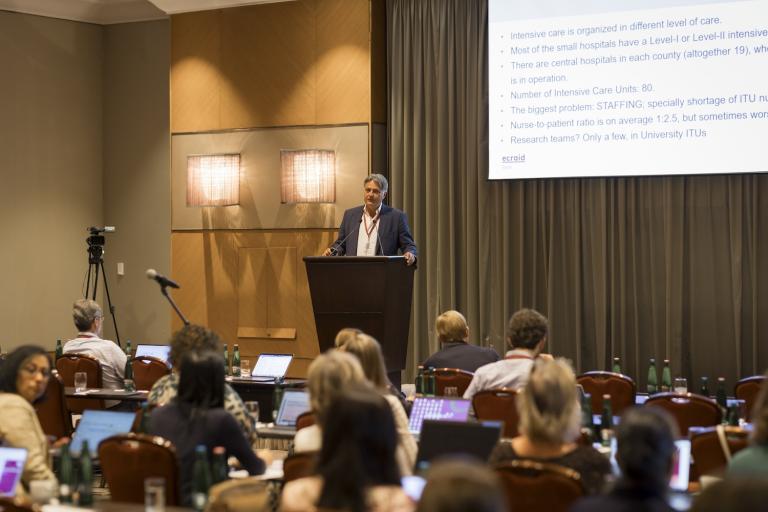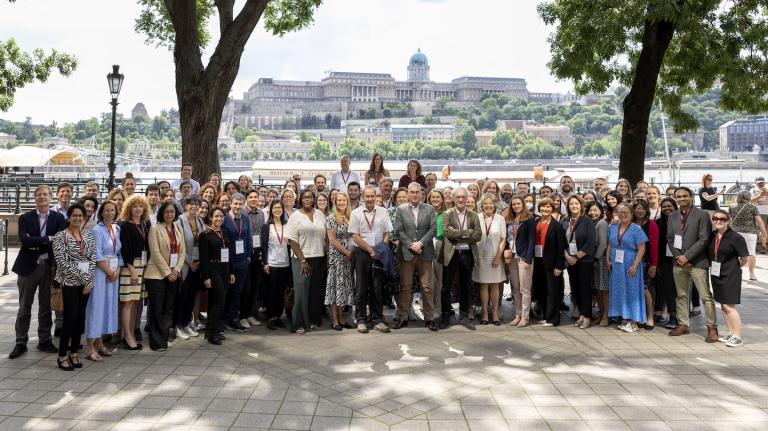ECRAID-Base holds 2024 General Assembly in Budapest
On 27 and 28 May 2024, the ECRAID-Base consortium came together in Budapest, Hungary for its third General Assembly. Representatives from all 19 member organisations met to share their progress, successes, and challenges in the spirit of true international collaboration.
This year's meeting began with an introduction by two Hungarian natives. Akos Csomos, Head of Department at the Medical Centre of the Hungarian Defence Forces, talked about the intensive care system in Hungary, mentioning both its strengths and weaknesses. He used this opportunity to give his foreign colleagues a crash course in Hungarian, introducing them to useful words such as egészségedre (cheers).
Botond Lakatos, an infectious diseases (ID) specialist at Hungary's National Institute of Hematology and Infectious Diseases, then gave a fascinating presentation on the history of ID in Hungary. Do you know what Kaposi sarcoma, vitamin C, and the mRNA vaccine have in common? That's right – it was Hungarian scientists who were instrumental for introducing all three to the world.

It was then time to get down to business. ECRAID-Base lead and Ecraid CEO Marc Bonten presented the progress the Ecraid foundation has made during the past year. It is important to remember that setting up Ecraid and helping it become self-sustainable is one of the project's objectives. Marc went over key organisational developments, such as new appointments and the release of Ecraid's 2023 annual report, as well as important scientific collaborations, such as SNAP and RECOVERY.
Photo: Akos Csomos introducing the intensive care system in Hungary.
Many interesting presentations followed. Ecraid CSO Evelina Taconnelli joined online from Verona, Italy to talk about data harmonisation of randomised clinical trials (RCTs) and cohorts. Both study designs are essential to produce evidence and advance our understanding of diseases and treatments, yet linking them can yield significant advantages and overcome the limitations of each study design, explained Evelina. She offered the EU-funded ORCHESTRA project as an example of how large-scale data harmonisation facilitates such marriage of designs.
The European Commission – the primary funder of the ECRAID-Base consortium – also contributed to the meeting with remote presentations by Katja Neubauer and Alessandra Martini. They talked about the European Union's efforts toward strengthening pandemic preparedness and antimicrobial resistance response.
The rest of the meeting was dedicated to the six studies running under the project, as well as the work packages that support them. The teams managing POS-VAP, POS-cUTI, POS-ARI-PC, POS-ARI-ER, POS-Disease X and REMAP-CAP each presented their study's progress, successes, and challenges. To date, more than 6,500 patients have been enrolled in the five perpetual observational studies (POS), and another 3,300 have been registered in the POS-ARI-PC Audit.
Next, the consortium heard from the teams responsible for laboratory work, data, preparedness, training, and communications.

Such a large project would of course be impossible to run without a competent grant- and project management team. Their presentation was therefore an eagerly awaited conclusion to a productive meeting.
We look forward to coming together again next year. In the meantime, take a look at this photo album containing moments from the meeting in Budapest.
